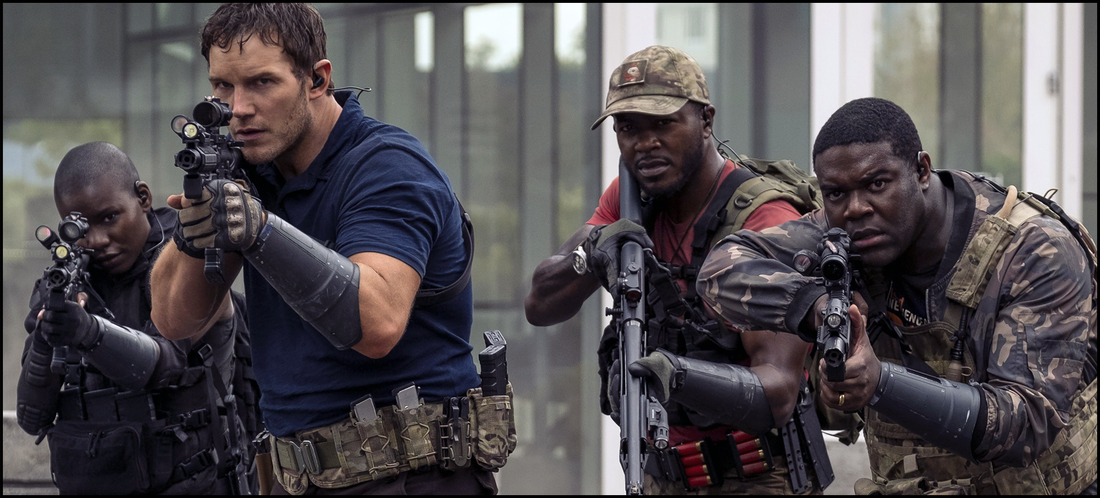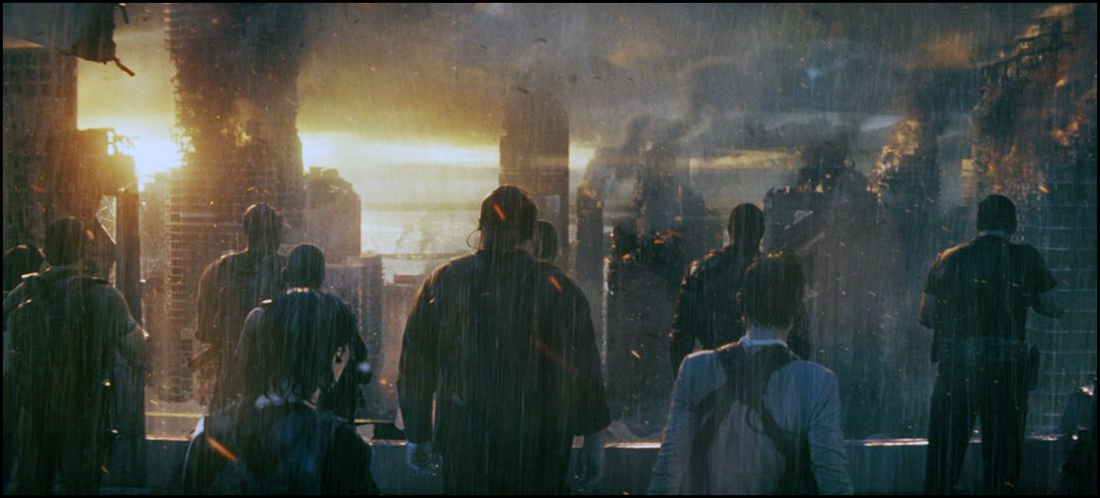A few months back, I was honestly incredibly surprised to learn that The Tomorrow War had been scarfed up by Amazon of all places. No disrespect intended to Prime Video (I am a subscriber, after all), but the film was crafted in the same vein as Aliens (1986), Independence Day (1994), and Battle Los Angeles (2011), which is to say its thrills and spills deserved to be seen up on the big screen (in all their glory) as opposed to the homegrown television set. These action sequences are big – at least, the ones I remembered were, and that was even with inferior effects – so I couldn’t imagine it working as well without the expansiveness of the silver screen. Alas, as I read the article, I learned that no theatre debuts of the finished product were planned, so I’d have to live with the disappointment.
Well, it’s finally streamed (watched it last night), and now after that long delay I think it’s time to divulge what I thought for those who’re interested. The short story? It’s pretty marvelous, all things considered. The long story? Well, it could’ve used a just a little more tinkering …
(NOTE: The following review will contain minor spoilers necessary solely for the discussion of plot and/or characters. If you’re the type of reader who prefers a review entirely spoiler-free, then I’d encourage you to skip down to the last paragraph for my final assessment. If, however, you’re accepting of a few modest hints at ‘things to come,’ then read on …)
From IMDB.com: “A family man is drafted to fight in a future war where the fate of humanity relies on his ability to confront the past.”
Sadly, that plot description is a bit off. I can assure you that it’s been written that way to keep spoilers from ruining the experience. The Tomorrow War is a picture that takes place in two distinct time zones – the present and about thirty years from present day – and those periods are necessary for this tale to work at all. I won’t spoil it for you (there are plenty of reviews online that already have) but suffice it to say that there are good reasons why screenwriter Zach Dean assembled it this way that relate to his characters, their relationships, and their respective journeys. All war movies are about survival, and Tomorrow is no different: what makes the film unique is the focus on f-a-m-i-l-y, and that’s worth a bit of dissection.
A conventional war film – say Saving Private Ryan (1998) – earns its stripes by showing how men and women of different backgrounds can rally around a certain cause – a certain mission – to achieve something extraordinary. On the road to completing their mission, they often grow closer together, and many narratives even structure these relationships like the nuclear family. There’s a father figure and maybe even a mother figure (though that position is likely filled with a male actor). There are siblings – older and younger – who serve in a capacity of watching out for one another. Again, the goal will be survival, but the quest to that destination is subjugated to the maintenance of the surrogate family: losses will be felt like a family, and gains will be celebrated much the same.
Thankfully, these ideas rarely enter the narrative of Science Fiction and Fantasy films. They do get toyed with from time-to-time (James Cameron’s Aliens eked mileage out of depicting the Weiland Yutani corporate control over the space marines in similar fashion to some all-powerful-yet-deluded government bureaucracy), but the focus in these genres typically leans heavily toward the heroics of the individual or the team “saving the day.” Escapism triumphs – Luke Skywalker trounces the Galactic Empire, Jake Sully embraces the blue aliens’ way of life instead of the greed of his human overlords, etc. – and audiences are better off for it. (That’s my opinion, and I’m sticking with it!)
But Tomorrow responsibly embraces the aftermath of war on the individual in more ways than one. Pratt’s everyman schoolteacher Dan Forester has a father, James (J.K. Simmons), who was one of those Vietnam veterans who found himself shunned and alienated upon his return from that conflict; and the two of them are played as moral opposites even though Dan’s wife Emmy (Betty Gilpin) pines for a reconciliation. No matter the benefit, Dan will not make peace with his father in the first two-thirds of the picture. However, once Dan returns from the future, he’s a changed man from what he’s seen (the audience has seen his eyes glaze over upon being reunited with his young daughter while she tries to speak to him about what she’s been up to while he’s been away). Only now can Dean’s script allow the two men to come together. (Granted, they find themselves with a shared purpose, but they had one at the film’s outset as well.)
There is more to this, but – as I’ve already promised to avoid spoiling it – I’ll leave it at that. Tomorrow proves it can be more than one type of motion picture: there’s no discounting that it’s a wartime action film, and it successfully melds into something a bit more once called to service. That’s admirable.
As for performances?
Pratt handles the first two-thirds of the film very well. It’s clear that he’s taken this box office stardom business seriously (this is his first time serving as an Executive Producer, and his Instagram feed shows he’s been very proud of this picture since its inception). As he’s done in the Jurassic Park flicks and The Magnificent Seven remake, he uses his skills to good effect as an action star. The dramatic stuff? Meh. He’s good, but that’s as far as I’ll go. The problem with the sum of his performance is Tomorrow’s last third has an awful lot of problems, cramming a ton of development into too little actual screen time, making the affair feel equally cliched and bloated, and it’s not a winning combination for any tentpole release. Simmons is good, and he definitely shows he has ‘the right stuff’ with the slim amount of time he’s given. Funnyman Sam Richardson delivers the film’s best comic relief, and Edwin Hodge turns in solid work as the soldier who’s just trying to run out the clock the way he wants.
Just in case anyone was wondering? With the exception of the effects work and perhaps some scene trimming here and there, I didn’t notice all that many differences between the cut I saw a year ago and what I watched last night. Some of Richardson’s antics were dialed back, and I think some of the footwork of Pratt and company’s arrival in the future may have been trimmed. The single greatest improvement was, understandably, the effects … which are as big and as bold as you’d want in a picture of this type. It looks phenomenal, and the action is definitely of the adrenaline-pumping variety. The dire threat are relentless when you expect them to be, and this is one alien menace I hope never shows its face in our star system any time while I’m on this side of the dirt.
Recommended, but I’ll happily admit that The Tomorrow War feels like a flawed three-act play: the first two acts are thrilling, near perfectly paced, nearly pitch perfect, while the big finish is rushed, clumsy, and forced affair, feeling like it was made by a different cast and crew. If the flick had put more time and effort into its third act, then this War wouldn’t have felt a bit long-in-the-tooth. As it stands, it’ll still likely be christened another feather in Pratt’s cap, though I’d imagine fans might not be so forgiving in his next bout.



 RSS Feed
RSS Feed